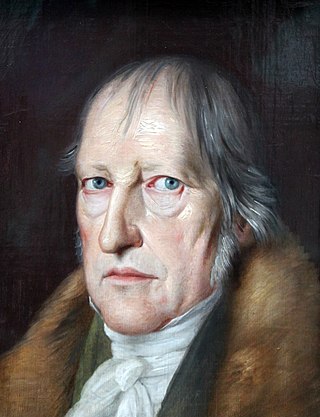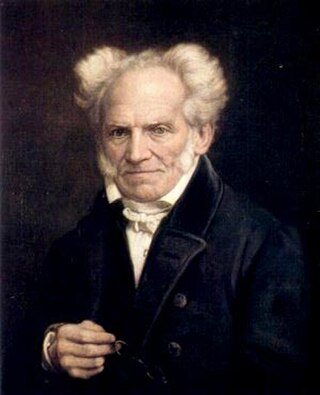Related Research Articles

Georg Wilhelm Friedrich Hegel was a German philosopher. He is one of the most important figures in German idealism and one of the founding figures of modern Western philosophy. His influence extends across the entire range of contemporary philosophical topics, from metaphysical issues in epistemology and ontology, to political philosophy, the philosophy of history, philosophy of art, philosophy of religion, and the history of philosophy.
Truth is the property of being in accord with fact or reality. In everyday language, truth is typically ascribed to things that aim to represent reality or otherwise correspond to it, such as beliefs, propositions, and declarative sentences.

The Tractatus Logico-Philosophicus is the only book-length philosophical work by the Austrian philosopher Ludwig Wittgenstein that was published during his lifetime. The project had a broad goal: to identify the relationship between language and reality and to define the limits of science. Wittgenstein wrote the notes for the Tractatus while he was a soldier during World War I and completed it during a military leave in the summer of 1918. It was originally published in German in 1921 as Logisch-Philosophische Abhandlung. In 1922 it was published together with an English translation and a Latin title, which was suggested by G. E. Moore as homage to Baruch Spinoza's Tractatus Theologico-Politicus (1670).

Friedrich Ludwig Gottlob Frege was a German philosopher, logician, and mathematician. He was a mathematics professor at the University of Jena, and is understood by many to be the father of analytic philosophy, concentrating on the philosophy of language, logic, and mathematics. Though he was largely ignored during his lifetime, Giuseppe Peano (1858–1932), Bertrand Russell (1872–1970), and, to some extent, Ludwig Wittgenstein (1889–1951) introduced his work to later generations of philosophers. Frege is widely considered to be the greatest logician since Aristotle, and one of the most profound philosophers of mathematics ever.

Nothing, no-thing, or no thing, is the complete absence of anything; the opposite of everything, or its complement. The concept of nothing has been a matter of philosophical debate since at least the 5th century BC. Early Greek philosophers argued that it was impossible for nothing to exist. The atomists allowed nothing but only in the spaces between the invisibly small atoms. For them, all space was filled with atoms. Aristotle took the view that there exists matter and there exists space, a receptacle into which matter objects can be placed. This became the paradigm for classical scientists of the modern age like Newton. Nevertheless, some philosophers, like Descartes, continued to argue against the existence of empty space until the scientific discovery of a physical vacuum.
Phenomenology is the philosophical study of the structures of experience and consciousness. As a philosophical movement it was founded in the early years of the 20th century by Edmund Husserl and was later expanded upon by a circle of his followers at the universities of Göttingen and Munich in Germany. It then spread to France, the United States, and elsewhere, often in contexts far removed from Husserl's early work.

Analytic philosophy is a branch and tradition of philosophy using analysis, popular in the Western world and particularly the Anglosphere, which began around the turn of the 20th century in the contemporary era in the United Kingdom, United States, Canada, Australia, New Zealand, and Scandinavia, and continues today. Analytic philosophy is often contrasted with continental philosophy, coined as a catch-all term for other methods prominent in Europe.

German philosophy, meaning philosophy in the German language or philosophy by German people, in its diversity, is fundamental for both the analytic and continental traditions. It covers figures such as Gottfried Wilhelm Leibniz, Immanuel Kant, Georg Wilhelm Friedrich Hegel, Karl Marx, Friedrich Nietzsche, Martin Heidegger, Ludwig Wittgenstein, the Vienna Circle, and the Frankfurt School, who now count among the most famous and studied philosophers of all time. They are central to major philosophical movements such as rationalism, German idealism, Romanticism, dialectical materialism, existentialism, phenomenology, hermeneutics, logical positivism, and critical theory. The Danish philosopher Søren Kierkegaard is often also included in surveys of German philosophy due to his extensive engagement with German thinkers.
Holism is the interdisciplinary idea that systems possess properties as wholes apart from the properties of their component parts. The concept of holism informs the methodology for a broad array of scientific fields and lifestyle practices. When applications of holism are said to reveal properties of a whole system beyond those of its parts, these qualities are referred to as emergent properties of that system. Holism in all contexts is opposed to reductionism which is the notion that systems containing parts contain no unique properties beyond those parts. Scientific proponents of holism consider the search for these emergent properties within systems the primary reason to incorporate it into scientific assumptions or perspectives.

Continental philosophy is a term used to describe some philosophers and philosophical traditions that do not fall under the umbrella of analytic philosophy. However, there is no academic consensus on the definition of continental philosophy. Prior to the twentieth century, the term "continental" was used broadly to refer to philosophy from continental Europe. A different use of the term originated among English-speaking philosophers in the second half of the 20th century, who used it to refer to a range of thinkers and traditions outside the analytic movement. Continental philosophy includes German idealism, phenomenology, existentialism, hermeneutics, structuralism, post-structuralism, deconstruction, French feminism, psychoanalytic theory, and the critical theory of the Frankfurt School as well as branches of Freudian, Hegelian and Western Marxist views.

Logical atomism is a philosophical view that originated in the early 20th century with the development of analytic philosophy. It holds that the world consists of ultimate logical "facts" that cannot be broken down any further, each of which can be understood independently of other facts.

In the fields of philosophy, the terms obscurantism and obscurationism identify and describe the anti-intellectual practices of deliberately presenting information in an abstruse and imprecise manner that limits further inquiry and understanding of a subject. The two historical and intellectual denotations of obscurantism are: (1) the deliberate restriction of knowledge — opposition to the dissemination of knowledge; and (2) deliberate obscurity — a recondite style of writing characterized by deliberate vagueness.
Coherence theories of truth characterize truth as a property of whole systems of propositions that can be ascribed to individual propositions only derivatively according to their coherence with the whole. While modern coherence theorists hold that there are many possible systems to which the determination of truth may be based upon coherence, others, particularly those with strong religious beliefs, hold that the truth only applies to a single absolute system. In general, truth requires a proper fit of elements within the whole system. Very often, though, coherence is taken to imply something more than simple formal coherence. For example, the coherence of the underlying set of concepts is considered to be a critical factor in judging validity for the whole system. In other words, the set of base concepts in a universe of discourse must first be seen to form an intelligible paradigm before many theorists will consider that the coherence theory of truth is applicable.
Philosophy is the study of general and fundamental problems concerning matters such as existence, knowledge, values, reason, mind, and language. It is distinguished from other ways of addressing fundamental questions by being critical and generally systematic and by its reliance on rational argument. It involves logical analysis of language and clarification of the meaning of words and concepts.
In semantics, semiotics, philosophy of language, metaphysics, and metasemantics, meaning "is a relationship between two sorts of things: signs and the kinds of things they intend, express, or signify".
Inductivism is the traditional and still commonplace philosophy of scientific method to develop scientific theories. Inductivism aims to neutrally observe a domain, infer laws from examined cases—hence, inductive reasoning—and thus objectively discover the sole naturally true theory of the observed.
The doctrine of internal relations is the philosophical doctrine that all relations are internal to their bearers, in the sense that they are essential to them and the bearers would not be what they are without them. It was a term used in British philosophy around in the early 1900s.
Metaphysics is the branch of philosophy that investigates principles of reality transcending those of any particular science. Cosmology and ontology are traditional branches of metaphysics. It is concerned with explaining the fundamental nature of being and the world. Someone who studies metaphysics can be called either a "metaphysician" or a "metaphysicist".

Western philosophy encompasses the philosophical thought and work of the Western world. Historically, the term refers to the philosophical thinking of Western culture, beginning with the ancient Greek philosophy of the pre-Socratics. The word philosophy itself originated from the Ancient Greek philosophía (φιλοσοφία), literally, "the love of wisdom" Ancient Greek: φιλεῖν phileîn, "to love" and σοφία sophía, "wisdom").

The aspects of Bertrand Russell's views on philosophy cover the changing viewpoints of philosopher and mathematician Bertrand Russell (1872–1970), from his early writings in 1896 until his death in February 1970.
References
- 1 2 3 Dreyfus, Hubert L. (1980). "Holism and Hermeneutics". The Review of Metaphysics. 34 (1): 3–23. ISSN 0034-6632. JSTOR 20127455.
- ↑ Michael Baur (ed.), G. W. F. Hegel: Key Concepts, Routledge, 2015, p. 193.
- ↑ Russell, Bertrand (2009-09-10). The Philosophy of Logical Atomism. Routledge. ISBN 978-1-135-22318-2.